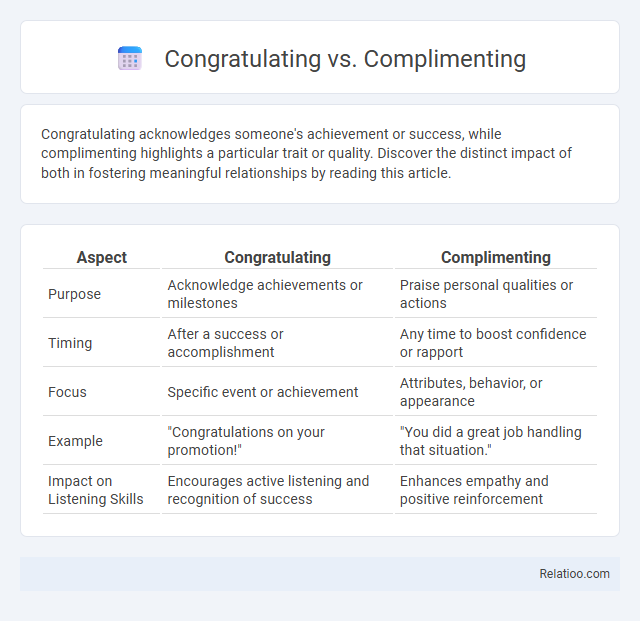Congratulating acknowledges someone's achievement or success, while complimenting highlights a particular trait or quality. Discover the distinct impact of both in fostering meaningful relationships by reading this article.
Table of Comparison
| Aspect | Congratulating | Complimenting |
|---|---|---|
| Purpose | Acknowledge achievements or milestones | Praise personal qualities or actions |
| Timing | After a success or accomplishment | Any time to boost confidence or rapport |
| Focus | Specific event or achievement | Attributes, behavior, or appearance |
| Example | "Congratulations on your promotion!" | "You did a great job handling that situation." |
| Impact on Listening Skills | Encourages active listening and recognition of success | Enhances empathy and positive reinforcement |
Understanding Congratulating and Complimenting
Understanding the difference between congratulating and complimenting enhances effective communication by recognizing specific achievements versus qualities or actions. Congratulating refers to expressing pleasure for someone's success or accomplishment, often linked to milestones like graduation or promotion. Complimenting involves praising someone's attributes, skills, or appearance, which can be spontaneous and less formal than congratulating.
Key Differences Between Congratulating and Complimenting
Congratulating involves acknowledging someone's achievement or success, emphasizing a specific accomplishment or milestone, while complimenting focuses on expressing admiration or praise for qualities, appearance, or efforts without linking to a particular event. You use congratulating to celebrate significant moments, like promotions or graduations, whereas complimenting can apply to everyday attributes such as style, intelligence, or kindness. Understanding these distinctions ensures your communication is appropriate and meaningful in social and professional contexts.
Psychological Impact of Congratulations
Congratulating someone reinforces positive behavior and boosts self-esteem by acknowledging achievements, which enhances motivation and strengthens social bonds. Complimenting often targets specific traits or efforts, fostering confidence and encouraging constructive behavior, whereas congratulation as a noun signifies the expression of this positive reinforcement. The psychological impact of congratulations lies in its ability to validate success, promote a growth mindset, and increase overall well-being by triggering reward-related neural pathways.
The Power of a Well-Timed Compliment
A well-timed compliment can boost morale and strengthen relationships by highlighting specific achievements or qualities, creating a positive emotional impact. Unlike congratulating, which acknowledges significant accomplishments or milestones, complimenting often focuses on personal attributes or everyday efforts, enhancing motivation and self-esteem. Understanding the nuanced differences between complimenting and congratulating allows effective communication that fosters encouragement and appreciation in both personal and professional settings.
When to Congratulate and When to Compliment
Congratulating is appropriate when acknowledging significant achievements or milestones such as promotions, graduations, or personal successes, emphasizing recognition of an accomplishment. Complimenting is used to praise someone's qualities, appearance, or efforts in everyday interactions without necessarily relating to a specific achievement. Your choice depends on the context--congratulate to celebrate notable success and compliment to express appreciation for positive attributes or actions.
Cultural Perspectives on Congratulating vs Complimenting
Congratulating and complimenting serve different social functions shaped by cultural norms; congratulating typically acknowledges achievements or milestones, fostering a sense of community and shared success, while complimenting often focuses on personal attributes or appearance, reflecting individual recognition and social bonding practices. In cultures valuing collectivism, congratulating emphasizes group harmony and success, whereas in individualistic societies, complimenting may highlight personal qualities and individual pride. Understanding these nuances enhances your ability to navigate social interactions respectfully and effectively across cultural contexts.
Appropriate Language for Congratulations
Congratulating someone involves expressing praise for an achievement or success, using phrases like "Congratulations on your promotion" to acknowledge milestones appropriately. Complimenting refers to praising qualities or attributes, such as "You have a great sense of style," which is more general and not necessarily tied to accomplishments. The noun "Congratulation" is often used in plural ("Congratulations") to convey the act of expressing good wishes, making it the suitable term for formal or informal celebrations of achievements.
Effective Ways to Compliment Sincerely
Complimenting sincerely involves focusing on specific qualities or achievements that genuinely stand out to you, making your praise more meaningful and impactful. When you compliment someone, you reinforce positive behavior and build stronger connections by being authentic and attentive to their efforts. Your thoughtful words should reflect genuine appreciation without exaggeration, ensuring your compliments are both effective and heartfelt.
Common Mistakes in Congratulating and Complimenting
Common mistakes in congratulating and complimenting often involve confusing when to use each appropriately; congratulating is reserved for acknowledging achievements or milestones, while complimenting focuses on praising qualities or appearance. Many people mistakenly say "complimenting" when they mean to express congratulations, leading to misunderstandings in your message. To avoid errors, remember that congratulation is the noun form tied to achievements, whereas compliment refers to positive remarks about characteristics or actions.
Enhancing Relationships Through Congratulations and Compliments
Congratulating someone celebrates their achievements and milestones, fostering positive feelings and strengthening bonds through genuine acknowledgment. Complimenting highlights personal qualities or actions, boosting confidence and encouraging ongoing positive behavior, which deepens mutual respect in relationships. Heartfelt congratulations and sincere compliments are powerful tools for enhancing interpersonal connections and maintaining supportive, uplifting interactions.

Infographic: Congratulating vs Complimenting
 relatioo.com
relatioo.com